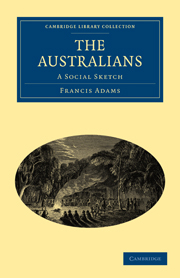IV - THE BUSH PEOPLE
Published online by Cambridge University Press: 07 October 2011
Summary
We have now come to the main body, which contains also the fons et origo, of the New Race.
The one powerful and unique national type yet produced in Australia is, I have asserted, that of the Bushman.
The smaller resident or squatter or manager almost always shows signs of him: sometimes is merely a slightly refined or outwardly polished form of him.
The selector comes nearer to him still, so near as often to seem almost identic, yet a fine but unmistakable shade of difference severs him from the true Bushman, the Bushman pure and simple, the man of the nation.
It is, then, in the ranks of the shearers, boundary riders, and general station hands, that the perfected sample must be sought, and it is the rapid thoroughness of the new social system, whose leading characteristics we have been considering, which has chiefly “differentiated” him already into this new species.
The Anglo-Australian has perished or is absorbed in the Interiors much more rapidly than on the sea-slope and in the towns.
Wire fences, we have seen, put an end to the old style of nomadic pastoralism with its shepherds, abiding in the field, keeping watch over their flocks by night, and with the Anglo-Australian shepherd disappeared one of the most striking identities of “the old colonial school.”
We still find strange people in the bush, pariahs of civilisation, men who have fallen from their place of pride in every conceivable manner, but they are rare to what they used to be.
- Type
- Chapter
- Information
- The AustraliansA Social Sketch, pp. 165 - 186Publisher: Cambridge University PressPrint publication year: 2011First published in: 1893



